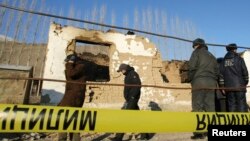The International Crisis Group has warned of growing radicalization in Central Asia, with an increase in the number of Islamic State recruits from the region.
The independent conflict resolution group estimates that in the past three years, 2,000 to 4,000 people in Central Asia have turned their backs on their nations' secular leadership and sought a radical alternative to the hardships they suffer at home.
ICG’s Central Asia Project Director Deirdre Tynan says an Islamic agenda has filled the void caused by disenfranchisement in post-Soviet Central Asia.
"Living standards are generally falling. The political system is quite exclusive. People are fed up with the current system," she told VOA's Uzbek Service from Bishkek, Kyrgyzstan.
Poor governance, corruption, crime, failure to deliver quality social services, lack of political and religious freedoms all contribute to what Tynan called the natural expression of peoples’ political and social ambitions at both local and national levels.
"People are seeking alternatives,” Tynan added.
The researcher said money is not a motivation for those drawn to IS-controlled territory. She said the appeal of Islamic State is broad, attracting both men and women, educated and uneducated, touching broad sections of society.
Worrying trend
An ICG report says the Islamic State threat to Central Asia is not immediate, but shouldn’t be discounted. Tynan said there is a "growing bed of radicalization" across the region and IS appears poised to exploit it.
"What is more worrying," she said, "is the reinvigoration of the terror groups that are more familiar to Central Asia such as the Islamic Movement of Uzbekistan because of the war in Syria. The group has retained its presence in Central Asia but it has not been active.”
The Islamic Movement of Uzbekistan or IMU, in partnership with the Taliban and other groups, fought against coalition troops in Afghanistan and carried out attacks in Pakistan. IMU has not pledged allegiance to IS, but has indicated its admiration.
"The IMU likes the appeal, the glamour of Islamic State and that has consequences for Central Asia, particularly, southern Kyrgyzstan and northwest of Tajikistan,” Tynan said.
Tynan calls on the governments of Uzbekistan, Kazakhstan, Turkmenistan, Kyrgyzstan and Tajikistan to address the issue.
“The problem of radicalization can be addressed by viewing it as a domestic problem, as an internal problem for each of these countries," she said. "Central Asian states are fond of pointing to third forces or external influences. They need to look at conditions inside the countries. Radicalization is the product of 20 years of misgovernance.”
‘Preventive action’ needed
ICG’s Europe and Central Asia Program Director Paul Quinn-Judge said Central Asia is fortunate that Syria is relatively distant, no major attacks have yet occurred, and the risks are still in their infancy.
“But governments should assess accurately the long-term danger jihadism poses to the region and take proper preventive action now," he said, and "not brush the danger aside or exaggerate it in a way that will only make the problem worse."
The International Crisis Group notes Russia and China are already concerned and have urged the Central Asian states to address the problem of radicalization in light of the rise of Islamic State.
The ICG says the region’s other international partners, including, the EU and the U.S., should recognize that Central Asia is a growing source of foreign fighters and consider prioritizing policing reform, as well as a more tolerant attitude to religion, in their recommendations for combating the problem.
The ICG's Tynan said, however, that without a concerted effort on the part of the Central Asians, including their security services with respect to intelligence sharing, the response outside powers seek will likely flounder.
U.S. Deputy Assistant Secretary of State for South and Central Asian Affairs Daniel Rosenblum said the United States does not want to see Central Asian countries become safe havens for terrorist groups.
“So we want to expand our security cooperation to meet threats that we share, transnational threats, terrorism, narcotics trafficking, and we also talked about the emergence of ISIL, the organization of ISIL,” he said, using another acronym for Islamic State.
And if such concerns do not move Central Asian governments to action, the ICG warns of the growing threats returning militants would pose to their own countries.




